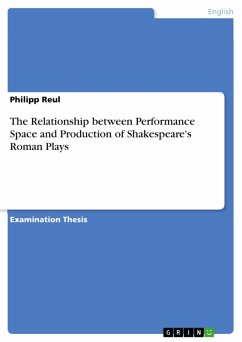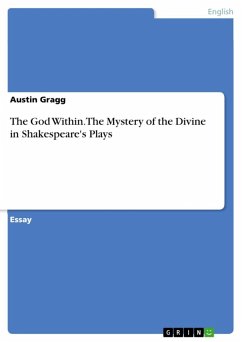Examination Thesis from the year 2006 in the subject English Language and Literature Studies - Literature, grade: 2,0, University of Cologne (Englisches Seminar ), language: English, abstract: Peter Brook's1 beginning of the 'Empty Space' assumes that a theatre performance consists of three very basic components. According to Brook, performances are dependent on a space in which spectator and actor come together and agree on a place which they call stage. It is in this real space that actors and audience imagine a fictional world. Brook's quotation, beautifully, encapusulates the simplicity of any theatre performance while it oversimplifies the complicated processes of bringing a play to life in the same breath. The empty space which Brook defines in his work is not realistic. It rather symbolizes his personal need to liberate his artistic talent from the fixed and institutionalized British theatre venues of the 1960's. In fact, for the majority of modern theatre performances, it is the theatre building which provides the space for all three basic parts. Although, it is true that no more than an empty space is needed for staging a play, during the last centuries the majority of performances have been sheltered by purpose built theatres. Most theatres provide a stage in the form of a proscenium stage, thrust stage or stage in the round. How a spectator looks at the actors performing on this stage differs, depending on the charcteristics of each theatre venue. A space in the theatre, may it be empty or filled, connects the two most important parts of any theatrical event, the audience and the actors. Space in the theatre is, therefore, crucial for every performance. The Elizabethan times mark the most influential period for modern theatre. Closely intertwined with the world's most famous playwright, William Shakespeare, it is in this time that the first modern theatres were erected. Therfore, Shakespeare's times and works are always closely connected with practices of today's theatre. The aim of this study is to research the relationship between the performance space of specific theatres and production of Shakespeare's Roman plays in Great Britain, in 2006. It will be discovered to what extent performance space can influence production of Shakespeare's Roman plays. Likewise, it will be examined how different productions make use of performance space. The question of which performance space works best for staging Shakespeare's Roman plays in 2006 forms the basis of this case study.
Dieser Download kann aus rechtlichen Gründen nur mit Rechnungsadresse in A, B, BG, CY, CZ, D, DK, EW, E, FIN, F, GR, HR, H, IRL, I, LT, L, LR, M, NL, PL, P, R, S, SLO, SK ausgeliefert werden.









